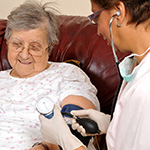Intergenerational Communication
A 2011 survey conducted by MJHS Hospice and Palliative Care revealed the following themes:
- Survivors do not talk about their health care wishes with their children, yet rely heavily on them for decision making
- Most do not have advance directives in place
- Children of Survivors do not want to upset their parents, so they avoid certain topics of conversation
- Caregiver burdens are enormous
- Children of Survivors are often overly protective of their parents
Children, and to some extent even grandchildren, of Holocaust Survivors often deeply identify with their loved ones’ pain and losses. They feel responsible for protecting their aging relatives from further suffering. They often express deep commitment and obligation towards the parents, starting at an early age.
Variety in Response
Themes of inter-generational communication of trauma are also prevalent, clearly demonstrating implicit identification with the traumatized parents. Some themes expressed by children of Survivors, and related to their need to protect their parents, include avoidance of conflict on the part of the children, difficulty putting their own needs ahead of the parents’ and a wish for greater autonomy from the parents. Conversely, some children of Survivors wish for greater closeness with their parents who, though extremely devoted, are emotionally unavailable—either emotionally distant or over-reactive—so that real open communication is impossible.
The adult child of Survivors might feel profoundly distraught, helpless, desperate, guilty and angry when facing the reality of aging and ailing parents and the inevitable limitations and inefficiencies of the health care systems. End-of-life decisions are particularly difficult for the children of Survivors who know that their parents overcame extreme odds to stay alive. Now, in turn, these children will do everything to keep their parents alive, even if that life does not promise much quality of life.
Four Typologies
Four types of Holocaust Survivors and their families, which differ in their styles of adaptation have been identified. Just as each differently impacts the children in these families, so too are the aspects of transmission of parental trauma to the Second Generation.
Types One and Two
The “victim” or “numb” type may tend to transmit anxiety, silence and lack of openness to relationships outside the family. They may also exhibit paranoid reactions to seemingly non-threatening stimuli.Types Three and Four
The “fighter” or “I made it” type may transmit the need for over-achievement, social activism, toughness or “take no prisoner” attitude in order to live life to the fullest.
Family Dynamics
“It is said that members of the Second Generation become ‘memorial candles’ to their parents and their murdered relatives, carrying with them unconscious aspects and identifying themselves with dead relatives.”
This dynamic adds a burden of responsibility and guilt and complicates natural processes of development, which propel adolescents to separate, rebel, experiment and fully develop independent identities.
 Issues of Separation
Issues of Separation
At every significant life transition, the Second Generation faces numerous additional conflicts around issues of separation and individuation. Reaching adulthood and establishing their own families and dual loyalties—with survivor parents on one side and a spouse, plus children—on the other, can often create
conflicts. For the maturing Second Generation, confronting the aging process of parents, making health care decisions on their behalf and preparing for their inevitable death bring about a realistic need for role reversal. These changes intensify the responsibilities borne by the Second Generation and can lead to anxious and desperate behavior by the adult children in their attempt to protect the aging parent. It might also be perceived as a huge burden and may foster resentment of the survivor parents by the Second Generation.
Members of the Second Generation are vicariously surrounded by death throughout their lives. Yet, they have never witnessed or experienced the actual death of an aging relative since most grew up without a circle of extended family, like (great) grandparents, uncles, aunts, etc. “Letting go” and mourning are foreign concepts and are overwhelmingly difficult in families of Holocaust Survivors. Instead of accepting natural death as part of the life cycle, it is experienced in the subjective context of traumatic loss.





